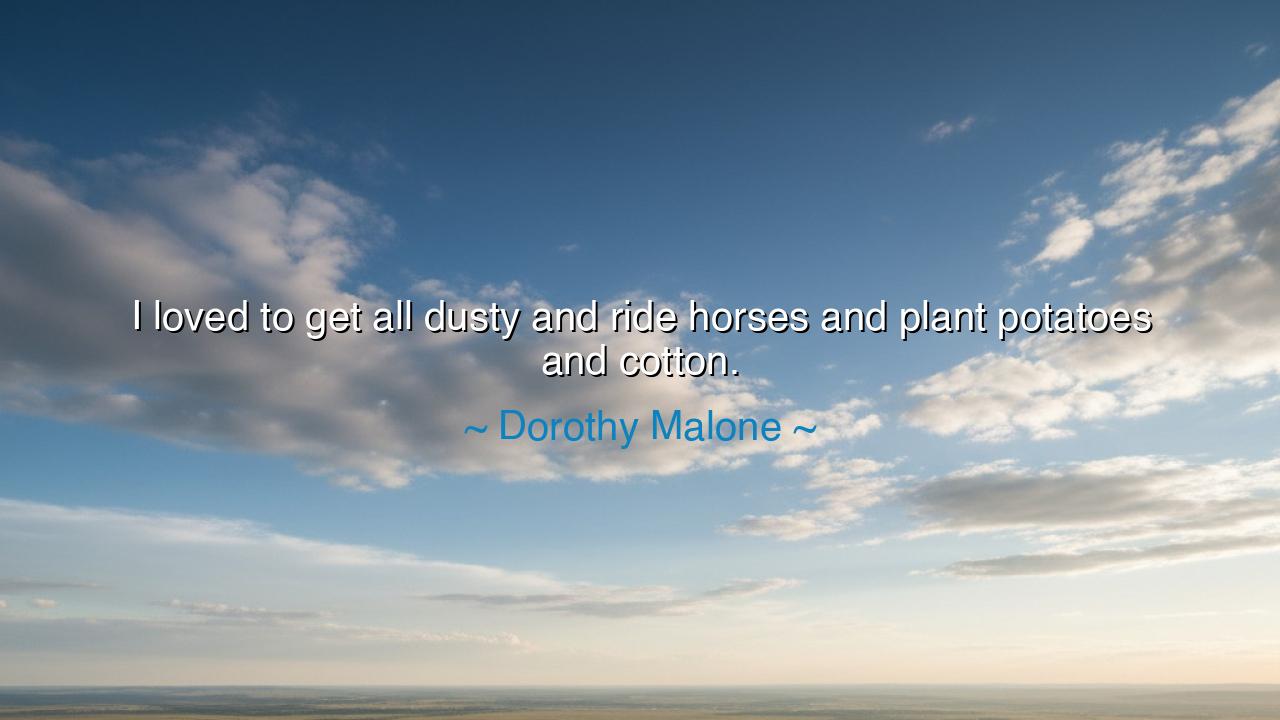
I loved to get all dusty and ride horses and plant potatoes and






Hear the words of Dorothy Malone, spoken with the warmth of memory and the strength of simplicity: “I loved to get all dusty and ride horses and plant potatoes and cotton.” To the hurried ears of the modern world, these may sound like the idle musings of a bygone age. But to the heart that listens, they are a hymn to the forgotten nobility of labor, earth, and freedom. In her words lives the spirit of the land — a spirit that finds beauty not in polish, but in dust, not in ease, but in effort, not in artifice, but in authentic living.
Dorothy Malone was an actress by trade, a woman of the silver screen, yet her words carry the fragrance of the open fields and the hum of honest work. She was born in the American South, where the earth and sky still spoke to those who listened. Her love for riding horses and planting crops was no mere pastime; it was the echo of a deeper truth — that joy does not come from what we own, but from what we touch and tend. Beneath the glitter of fame, she carried within her the memory of the soil, the humbling dust of labor, and the fierce freedom of the open air.
To be “dusty,” as she says, is to be unafraid of life’s rawness. It is to walk in the world with both feet on the ground, unashamed of sweat, unbothered by imperfection. For dust is the sign of life lived fully — it clings to those who dare to engage with the earth, who move through the world without fear of its rough edges. In the ancient scriptures and myths, dust is sacred: man was formed from it, and to it he returns. To embrace dust, therefore, is to honor the cycle of life — to accept both humility and belonging.
Think of Theodore Roosevelt, who, though born into wealth, found his true strength not in mansions but in the wilderness of the Dakota Badlands. He rode horses through storms, built fences with his hands, and let the wind and earth harden him into the man who would one day shape a nation. Like Dorothy Malone, he understood that greatness grows from contact with the real — from the wind on the face, the ache of muscle, the smell of earth freshly turned. Those who live close to nature, who labor in it, are purified by its truth.
There is a deeper poetry in planting — in the act of putting one’s hands into the soil and trusting that something invisible will grow. When Dorothy spoke of planting potatoes and cotton, she spoke of more than farming; she spoke of the timeless human act of creation through patience. The one who plants does not demand instant reward — they give, and they wait. In this, they mirror the wisdom of the universe: that all things worth having must be sown before they can be reaped. Each seed buried in darkness becomes a quiet promise between man and the earth.
The horse, too, in her words, stands as a symbol of freedom and companionship — of the ancient bond between humanity and the living world. To ride is to trust, to let go of control while remaining in harmony with motion. It is the union of strength and surrender, power and grace. The rider who becomes one with the horse becomes, in spirit, one with nature itself — unbound, unconfined, alive in the rhythm of the earth.
From her simple recollection, we draw a powerful lesson: that happiness is not found in luxury or escape from labor, but in participation — in working, sweating, and creating alongside the world that made us. To “get dusty” is to live honestly, to return to what is elemental. In every life, there must be something planted, something tended, something ridden forward with courage. Those who keep their hands clean may preserve comfort, but they lose connection; those who dare to soil them with dust and effort discover the deeper joy of existence.
So, dear listener, take heed of Dorothy Malone’s humble truth: do not fear the dust, for it is the mark of living. Walk where the soil remembers your steps. Plant something — not only in the ground, but in the heart. Ride toward your dreams with the same unguarded spirit that feels the wind as both challenge and blessing. For in the end, it is not the polished that endure, but the dusty, the daring, and the devoted — those who have touched the earth and loved it well.






AAdministratorAdministrator
Welcome, honored guests. Please leave a comment, we will respond soon